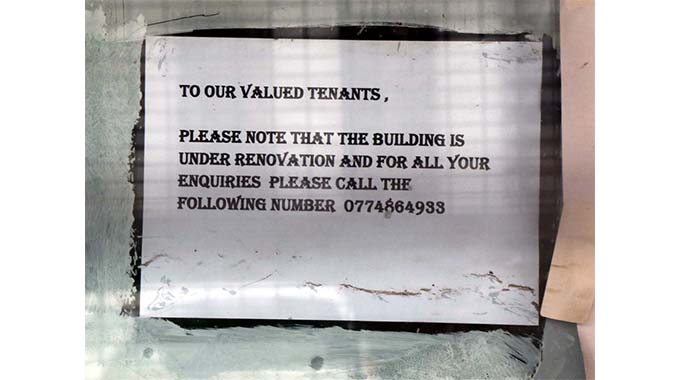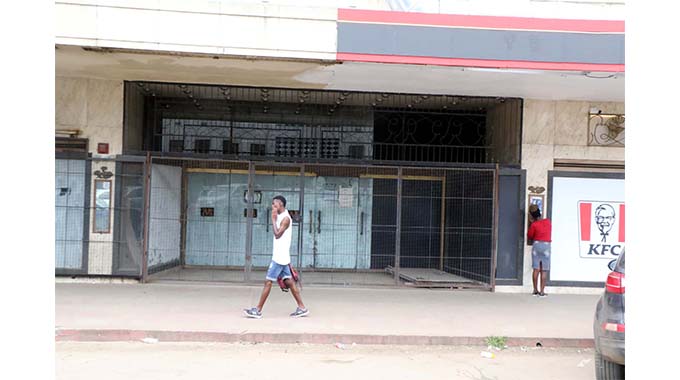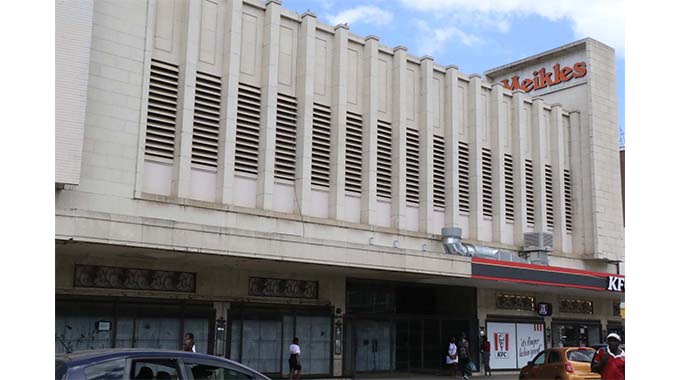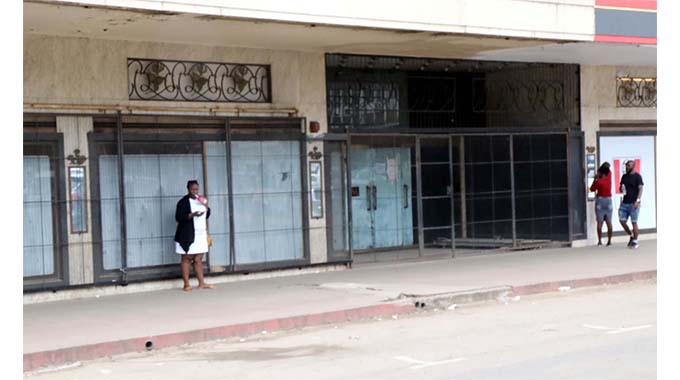
The Sunday News

Bruce Ndlovu, Sunday Life Reporter
PRINTED in black bold letters, the notice on what used to be the main entrance to Meikles Department Store in Bulawayo simply reads: “PLEASE NOTE THAT THE BUILDING IS UNDER RENOVATION AND FOR ALL YOUR ENQUIRIES, CALL THIS NUMBER . . .”
While the intention of the notice is to inform, it is upstaged as a spokesperson by the state of the entrance and the surrounding pavement on what was once one of the most prestigious department stores in the region.

Dust gathers on steel railings that surround the store while an assortment of notices cling with elastic strength on the store’s notice board. While some notices have peeled off, a few others remain advertising a wide range of services and goods that range from textbooks to ointments that have the ability to heal an impressive array of ailments.
While it is said that the erstwhile department store’s premises are under renovation, there is little activity to indicate that it is undergoing any extensive reconstructive surgery. From the outside, looking into the store front’s tinted glass exterior, everything looks rather bleak, and a betting man would wager that even rodents have found a home inside what was Thomas Meikle’s crown jewels.
Just a stone’s throw away however, the corner of the building still resembles a vision that old Thomas, known for his reputation of meanness and uncompromising high standards, would have approved.

Meikles closed.
Colonel Sander’s Kentucky Fried Chicken (KFC) has taken a significant bite of the old Meikles and as one passes the ruins of one entrance to the former mighty department store, they are greeted by alluring smells that now waft across from the corner of Leopold Takawira and Jason Moyo.
The KFC franchise is as sleek and impressive as any of its branches that are now dotted around the globe. It is also an apt illustration of changing trends in Bulawayo, with old, historic buildings now slowly fading and being replaced by new players that are reconfiguring the Bulawayo cityscape.
Change has come and that transformation has not been felt more keenly than the city’s erstwhile department stores. Since the turn of the century, the department stores in the city have bore the brunt of changes in the global and local economy.
For some older residents of Bulawayo, the decline of these department stores, brings pangs of pain as they reminisce about “the good old days”. For the so-called ama2K, the younger generation that never had the privilege of seeing these places in their heyday, they are a little more than a myth.
Few among this generation, which do not have the luxury of reminiscing about what once was, would know that a lot of couples had their wedding receptions at the old Meikles.
Fewer still would know about Sanders Department Store, located at the corner of what is now 8th Avenue and Jason Moyo. Founded by Arthur Sanders in 1923, Sanders was one of Bulawayo’s premier stores and so successful did it become that it opened branches in Harare and Ndola, the latter closing in 1934, after a slump in copper prices.
By the 1970s, the company had a branch in the Ascot Centre, and a subsidiary in First Street, Harare, where The Bird Cage Tea Lounge was one of the highlights.

Like Meikles, which had as many as 28 shop windows at some point, Sanders was home to some of the most luxurious brands.
In its golden heyday, where gentlemen knew they could count on the department store for the latest shades in flannel trousers, Sanders had fascinating tubes where the shop assistant would put one’s money and invoice, which would shoot up to the accounts department before the change would shoot down the chute and be back in a flash with a receipt. The corner building still stands, but is now home to a fast-food enterprise.
On what is now 9th Avenue and Jason Moyo, Woolworths was another department store that at one time seemed to have grown immovable roots in the City of Kings.

Covid-19
By the 1950s, the chain’s American founder, F W Woolworth had a store in virtually every major shopping street across the UK and eager to continue to expand their sales and profits after conquering the British Isles, the company settled for the Caribbean and Zimbabwe. The second Zimbabwean store, in Bulawayo, opened in Bulawayo in 1963. The architecture was influenced by the American parent company, which had experience in opening stores in the warm climate of Florida, Mexico and Cuba, and suggested a number of innovations at the purpose-built store. The vertical Woolworth signs from above the fascia to roof-level featured on many American stores opened or relocated in the 1950s and 1960s but were rarely used in the UK.
On 8th Avenue, between Jason Moyo and Joshua Mqabuko streets, Cuthberts still stands but is rather a pale shadow of its glorious former self. In fact, younger residents might not know that the building was once a department store as beneath it, Charms International, a multi-purpose shop that sells electrical goods and gadgets, has now taken space. That shop itself is a throwback to a bygone age, with its windows advertising brands like Philips and Supersonic who seem to have been outpaced by technological developments in the 21st century.

In a bygone age, all these stores were in constant competition, vying for the honour of having the most attractive store fronts, with the best awarded a cup at the end of the year.
So, what has led to the decline of these once great titans that were key landmarks in the city before every phone had a GPS system? For one, the shopping habits of Zimbabweans have changed over time. With dwindling disposable incomes, Zimbabweans have had to turn to cheaper alternatives for their furniture and fashion needs. The Savile row that costs a fortune does not seem to be as attractive as a suit fished from a “bhero” that is only a wash and ironing away from usable condition. In its trading update in 2021, Edgars noted that a rising cost of doing business, liquidity constraints, high cost of borrowings, Covid-19 challenges as well as generally low disposable incomes made the operating environment difficult for the business.
This unfortunately, has been more or less the case for the past two decades. Last year government also acknowledged the impact of informal operators on the bottom lines of retail operators.
“Government is aware that a lot of people survive on selling second-hand clothes,” said the Minister of State for Presidential Affairs responsible for monitoring implementation of Government programmes, Dr Jorum Gumbo. “The increase in the importation of second-hand clothes has had far-reaching negative consequences on the economy, especially on the cotton sector. I refer here to the closure of clothing factories, wholesalers and retailers due to reduced sales. Spinning industries have also been affected and cotton farmers have not been spared due to the drastic fall in cotton producer prices.

Cde Dr Jorum Gumbo
There is no doubt that this matter remains an impediment to the revival of our cotton sector and must be addressed.”
For furniture, most Zimbabweans now prefer to procure from South Africa where prices are thought to be cheaper, with “runners” going up and down the border on a daily basis to satisfy their clients’ needs.
As more informal players enter the scene, the competition for once mighty outlets might be literally on their doorstep. Only recently, Edgars had to close a branch in Bulawayo because of vendors, some of whom also sell clothing.

Edgars closes Retail Outlet
“We have officially closed the branch, we won’t be using that place anymore because there is now an influx of illegal forex traders and vendors outside the store and it was no longer aligning with the expectations of our brand,” said Edgars southern region operations manager, Mr Thulani Ncube.
“Edgars is an upmarket brand, so our customers are people who would love shopping convenience in terms of parking space and ambiance outside and inside the shop and minimal interactions when doing their shopping.”
With clothes and appliances spilling out of car boots on almost every street corner, it is perhaps unlikely that department stores will ever become a force in Bulawayo again. For some, this is not a bad thing, as instead of one giant supplying everything, department stores like Haddon and Sly are now host to many small businesses all with something different to offer. A large cake sliced into many tiny pieces means everyone gets a taste. However, for others, the decline of the department stores is a nod back to a heyday whose sun they wish never set.



